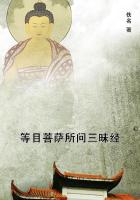When we judge of another's assurance in death, which, without doubt, is the most remarkable action of human life, we are to take heed of one thing, which is that men very hardly believe themselves to have arrived to that period. Few men come to die in the opinion that it is their latest hour; and there is nothing wherein the flattery of hope more deludes us; It never ceases to whisper in our ears, "Others have been much sicker without dying; your condition is not so desperate as 'tis thought; and, at the worst, God has done other miracles." Which happens by reason that we set too much value upon ourselves; it seems as if the universality of things were in some measure to suffer by our dissolution, and that it commiserates our condition, forasmuch as our disturbed sight represents things to itself erroneously, and that we are of opinion they stand in as much need of us as we do of them, like people at sea, to whom mountains, fields, cities, heaven and earth are tossed at the same rate as they are:
"Provehimur portu, terraeque urbesque recedunt:"
["We sail out of port, and cities and lands recede."--AEneid, iii. 72.]
Whoever saw old age that did not applaud the past and condemn the present time, laying the fault of his misery and discontent upon the world and the manners of men?
Jamque caput quassans, grandis suspirat arator .
Et cum tempora temporibus praesentia confert Praeteritis, laudat fortunas saepe parentis, Et crepat antiquum genus ut pietate repletum."
["Now the old ploughman, shaking his head, sighs, and compares present times with past, often praises his parents' happiness, and talks of the old race as full of piety."--Lucretius, ii. 1165.]
We will make all things go along with us; whence it follows that we consider our death as a very great thing, and that does not so easily pass, nor without the solemn consultation of the stars:
"Tot circa unum caput tumultuantes dens,"
["All the gods to agitation about one man."--Seneca, Suasor, i. 4.] and so much the more think it as we more value ourselves. "What, shall so much knowledge be lost, with so much damage to the world, without a particular concern of the destinies? Does so rare and exemplary a soul cost no more the killing than one that is common and of no use to the public? This life, that protects so many others, upon which so many other lives depend, that employs so vast a number of men in his service, that fills so many places, shall it drop off like one that hangs but by its own simple thread? None of us lays it enough to heart that he is but one: thence proceeded those words of Caesar to his pilot, more tumid than the sea that threatened him:
"Italiam si coelo auctore recusas, Me pete: sola tibi causa est haec justa timoris, Vectorem non nosce tuum; perrumpe procellas, Tutela secure mea."
[If you decline to sail to Italy under the God's protection, trust to mine; the only just cause you have to fear is, that you do not know your passenger; sail on, secure in my guardianship."--Lucan, V. 579.]
And these:
"Credit jam digna pericula Caesar Fatis esse suis; tantusne evertere, dixit, Me superis labor est, parva quern puppe sedentem, Tam magno petiere mari;"
["Caesar now deemed these dangers worthy of his destiny: 'What!' said he, 'is it for the gods so great a task to overthrow me, that they must be fain to assail me with great seas in a poor little bark.'"--Lucan, v. 653.] and that idle fancy of the public, that the sun bore on his face mourning for his death a whole year:
"Ille etiam extincto miseratus Caesare Romam, Cum caput obscura nitidum ferrugine texit:"
["Caesar being dead, the sun in mourning clouds, pitying Rome, clothed himself."--Virgil, Georg., i. 466.] and a thousand of the like, wherewith the world suffers itself to be so easily imposed upon, believing that our interests affect the heavens, and that their infinity is concerned at our ordinary actions:
"Non tanta caelo societas nobiscum est, ut nostro fato mortalis sit ille quoque siderum fulgor."
["There is no such alliance betwixt us and heaven, that the brightness of the stars should be made also mortal by our death."--Pliny, Nat. Hist., ii. 8.]
Now, to judge of constancy and resolution in a man who does not yet believe himself to be certainly in danger, though he really is, is not reason; and 'tis not enough that he die in this posture, unless he purposely put himself into it for this effect. It commonly falls out in most men that they set a good face upon the matter and speak with great indifference, to acquire reputation, which they hope afterwards, living, to enjoy. Of all whom I have seen die, fortune has disposed their countenances and no design of theirs; and even of those who in ancient times have made away with themselves, there is much to be considered whether it were a sudden or a lingering death. That cruel Roman Emperor would say of his prisoners, that he would make them feel death, and if any one killed himself in prison, "That fellow has made an escape from me"; he would prolong death and make it felt by torments:
"Vidimus et toto quamvis in corpore caeso Nil anima lethale datum, moremque nefandae, Durum saevitix, pereuntis parcere morti."
["We have seen in tortured bodies, amongst the wounds, none that have been mortal, inhuman mode of dire cruelty, that means to kill, but will not let men die."--Lucan, iv. i. 78.]















